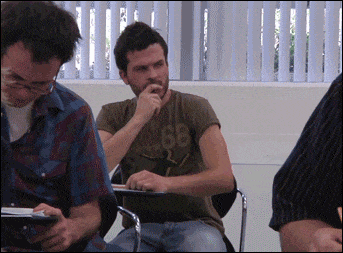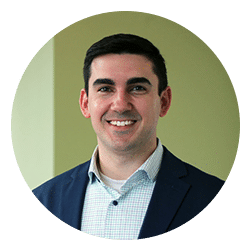One of the questions I get asked the most is “When should I start studying for the CPA exam?” Generally speaking, the sooner you begin studying for the CPA exam the better.
The content covered by the Certified Public Accountant exam closely resembles what you need to earn your accounting degree. By delaying the process you run the risk of forgetting a ton of useful information and may need to spend more time relearning things.
Plus, life tends to speed up and get busier when you’re older, so it’s usually harder to carve out the time required to study as you get older.
That being said, it’s never too late to study and sit for the CPA exam, so don’t let anyone tell you otherwise!
The answer ultimately depends on whether you’re still in college, recently graduated or have already started your career. Let’s break down the best advice for each of these scenarios and see when each should start studying for the CPA exam. We’ll also take a look at the best time to take the exam, since that’s a hot topic too.
Contents
CPA Exam Dates for College Students
When Should College Students Take the CPA Exam?
For most college students I suggest waiting until AFTER graduation to begin studying for the CPA exam. Why? The CPA exam takes a TON of time, even more so if you haven’t completed your college accounting curriculum. Plus you only have an 18 month window to pass all four sections of the exam, so taking and passing one too early may come back to haunt you later.
Here’s what to do instead:
Before Your Final Year
Research and find out exactly what’s required to sit for the CPA exam where you plan to live/work after school. The general requirements are mostly the same but do vary from state to state. This will give you time to make any necessary changes to your course load before you graduate.
During Your Final Year
ENJOY yourself. You’re only young once and there will be plenty of time to prep for the CPA exam later. Party, go on that road trip, spend time with friends that you won’t see as often once you’re done with school. Trust me, you’ll be thankful you did.

During Your Last Semester
Begin the application process and schedule your first CPA exam section within 2-3 months of graduation. If you haven’t done so already, this is also when you should start researching and deciding which CPA review course you’d like to study with. There are lots of great courses so I recommend trying a few out and leaning towards one that best fits your personal learning style.
After Graduation
ENJOY your newly-found freedom for a week or two, but then plan to knock out as the CPA exam as soon as practical. If you’re starting a full-time job right after graduation then you may want to take a few weeks to settle into your new role. Otherwise, plan to commit yourself to studying right away while you have the extra time.
A More Aggressive Path
That was my advice for MOST college students.
That being said, many states allow candidates to sit for the exam BEFORE they graduate or complete their 150 hours. If you really don’t mind the extra workload and are truly motivated enough, you can always move this timeline up and take a section or two BEFORE you finish school.
CPA Exam Dates for Recent Graduates
When Should Recent College Graduates Take the CPA Exam?
First of all, congratulations! ENJOY your newly-found freedom for a bit, but then plan to knock out the CPA exam as soon as you can.
If you’re starting a full-time job right after graduation then be mindful of your work schedule as you might have to plan your studying around any busy parts in the schedule. Aim to sit for (and pass!) all four sections of the CPA exam within your first year. Many employers offer bonuses for passing the exam within a certain time frame, and having your certification usually makes you eligible for other firm bonuses or even promotions.
If you have a few months until you start your job or are still looking for a job then start studying right away while you have the extra time and get as many out of the way as possible. This will show your boss (or potential employers) that you’re serious about your career. Even if you can’t pass all four sections before you begin working, having a few under your belt will make things much easier.
No matter what your job status is, plan to complete the CPA exam as soon as possible. Not only will this make you be eligible for bonuses, pay raises and promotions much sooner, but life just tends to get busier as time goes on.
Don’t Wait
Candidates often think they need to wait until they’ve started their job to begin studying because many employers pay for their CPA review courses and exam fees. Most firms and companies are flexible with this policy and will reimburse you once you start working, so don’t be afraid to ask them!
Just be sure to get their agreement in writing and keep all of your receipts for any courses or registration fees, as you’ll likely need to submit them for reimbursement.
CPA Exam Dates for Accountants and Career Professionals
When Should Accountants and Career Professionals Take the CPA Exam?
If you’ve been out of school for a while (>3 years) then don’t worry, it’s never too late to sit for the CPA exam!

You’re likely much busier at this stage of your life / career, so you’ll need to be strategic with your time. The clock on your 18 month window starts as soon as you pass your first section so you’ll need to plan accordingly.
Since you probably have a good feel for your schedule by now, the first thing you should do is chart out a realistic study plan. The best CPA review courses include study planners with their course software, but you can easily do these steps on your own.
- Sit down with a calendar and identify at least-chaotic 6-9 months of the year that can accommodate your CPA exam prep. For example, if you’re in public accounting, busy season usually runs from mid-January through mid-April of every year and is nearly impossible to accommodate CPA exam prep, but summers and fall are usually more chill.
- Next, figure out how much time you can consistently devote to studying each week. And be honest! Consistency and momentum are critical to passing the CPA exam. Without them you’ll end up forgetting things and spending a lot of time relearning topics. Aim to study 4-6 days each week for roughly the same amount of total hours each week. As a rule of thumb each exam section takes roughly 100 hours of prep time, so even if you can only study 10-15 hours each week then you’ll still be on track to pass once section every 2-3 months!
- Once you have an idea of how long it’ll take to prepare for each CPA exam section, mark off the rough dates you plan to start studying for and take each exam. If possible, aim to sit for (and pass!) all four parts within 12 months of passing your first exam. I know this isn’t realistic for everyone, but this would leave you with a solid 6 month buffer in case you fail a section and need to retake an exam.
Once you have your plan in place, all that’s left is to get started! This is when you should submit your CPA exam application, choose a CPA review course, and start hitting the books!
Finding Time for the CPA Exam
It’s unlikely that studying will fit perfectly into your schedule, so try to be creative in making time to study or be willing to use vacation time.
Thankfully many accounting firms and employers now offer generous or unlimited vacation, but if this isn’t an option there are still a variety of ways to fit studying into your life. You can wake up 1-2 hours early each morning, shift down to part-time work, or study during your lunch hour, just to name a few.
There’s no magic formula here so find out what works for you. Just make sure to consistently follow your plan and commit to meet your study goals each week.
You should also make sure your support network is mindful of the sacrifices you need to make and encourage you on your journey. It really can be difficult to take time away from kids, family and friends, so the more they’re aware of your CPA exam plans the better.
Ditto for your coworkers and boss. Relaying your CPA exam ambitions at work may allow you to shift some responsibilities off your plate!
When Should I Start Studying for the CPA Exam?
Many candidates ask, “How long should I study for the CPA exam?” There’s no magic number of hours, but a good rule of thumb is to plan on spending approximately 100 hours preparing for each exam section (AUD, BEC, FAR and REG). Assuming you can study 15-20 hours each week, this translates to roughly 1-2 months of prep time per section. With this in mind, you should aim to start studying about 8 weeks before your CPA exam date.
When is the Best Time of Year to Take the CPA Exam?
This is another popular question among CPA exam candidates. For example, legend has it that March and April is the best time to take REG since most tax accountants are still in the middle of their busy season and not sitting for the CPA exam, so there’s “less competition” in the bell-curve. That’s ridiculous.
The CPA exam is the same CPA exam no matter what time of year you take it, so plan your CPA schedule in a way that makes the most sense for you. If you’re a tax accountant, this may mean that late May-early June is the best time to take REG since you’ll be coming right off of tax season. If you’re in Audit then perhaps late fall is the ideal time to knock out AUD and BEC.
Just figure out what works best for your schedule and stick to your plan.
Bottom Line
By now one thing should be plainly obvious: the best time to start preparing for the CPA exam is right now!
Whether it’s getting your application paperwork together, researching and choosing a CPA review course, or sitting down to begin studying, take action TODAY.
Your future self will be thankful you did!
Featured image courtesy of Mohamed Hassan from Pixabay.


